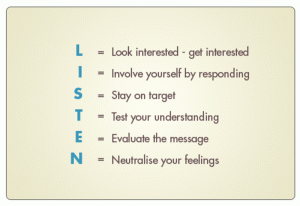
Shakirah Hunter
Opinions are everywhere. We are inundated with information on every topic possible. And we too have opinions on every topic possible. But the question is: who is listening – who has taken the time to quiet their own responses to listen. It has become so easy to listen simply to form our own reply or to debunk the opinion that we disagree with. We have learnt the art of listening to what we want to hear and then breaking down what we disagree with. In conversation with others, it seems like we cannot listen to another person who we disagree with. Sparks always fly, because we want every person to think exactly as we do and we only like to listen to those who correspond to our thinking.
How do we listen to the words of Allah?
Allah Ta’ala speaks about the act of listening seventeen times in the Holy Qur’an on its own and nineteen times together with sight! It is fascinating that Allah Ta’ala has connected the act of ‘Istimaa’ to the recitation of the Qur’an and at the same time he adds on ‘insaat’. Listening to the Qur’an with istimaa’ is regarded as active listening. This is when we stop all other work and actions and decide to listen with the sole intention of allowing the words of Allah to create an effect in our lives. Together with listening actively we need to bring the act of insaat which is a complete stillness of the voice, the mind and all movement. Allah Ta’ala highlights this in the following ayah :
واذا قُرِئَ الْقُرْآنُ فَاسْتَمِعُوا لَهُ وَأَنصِتُوا لَعَلَّكُمْ تُرْحَمُونَ
When the Qur’an is recited, listen attentively to it whilst completely silent so that mercy may be shown to you.
Allah Ta’ala highlights to us the first act of active listening, and this is connected to how we listen to the words of Allah. At the end of the ayah, Allah Ta’ala connects this action of istimaa to obtaining the mercy of Allah Ta’ala. It is only when we have the ability to completely still our minds and responses and listen to benefit ourselves and to create change in our lives – that we are truly listening.
Allah Ta’ala highlights listening to us in a few different ways in the Qur’an. Each way serves to highlight a different understanding of the effect of active listening. Allah says in surah Anfaal: “Don’t be like those who say they have heard whilst they don’t hear.”
This form of listening is when we listen to the words of Allah and His Rasul (S) but the reality of those words does not impact any change on our actions and our acts of obedience to Allah.
We listen to hundreds of talks, bayans, podcasts, lectures – but the real question is how are we listening? Have these words effected change on our lives and behavior? Allah Ta’ala says to us in Surah Yunus: “Most certainly in that are signs for those who listen”. This is the most important act of a life of a believer – the connection towards understanding the signs of Allah and allowing it to shake us out of our slumber.

How do we listen to people?
We often listen to people to learn, to obtain information, for enjoyment or perhaps to create understanding. However, when we listen, we sometimes listen but don’t grasp the true meaning of the person communicating with us. This is because we are usually focusing on our own thoughts, ideas, and internal dialogue whilst the person is speaking. At times, we have so much on our plates and our never-ending to-do lists does not allow for us to listen with complete attention. Or we listen with our own bias and are only listening to respond and attack the other persons opinion.
The Holy Prophet (S) has taught us the active manner of listening to people.”كان رسولُ الله يُقبِل بوجهِه وحديثِه على شرِّ القوم يتألَّفُهم، وكان يُقبِل بوجهِه وحديثِه عليَّ حتى ظننتُ أني خيرُ القوم”
Amr ibnul Aas explained the speech of Nabi (s):“The Holy Prophet (s) used to grant full attention to the person he was speaking to, with his physical direction and his speech – even to the most evil of people. He would make them feel comfortable enough to speak to him. And the Prophet (S) would grant me complete attention with his words and his speech until I would think that I am the best of people.”
In listening to people with the desire to listen and not focusing on our own reply, we build a deeper connection to people, and we learn to learn from others – even if we may disagree with them.
How do we listen actively?
- Don’t undermine the person you are listening to with your own ideas and thoughts. Even if you may be more intelligent, experienced, or talented.
“إذا جالستَ العالمَ فأنصتَ، وإذا جالستَ الجاهل فأنصِتَ،
ففي إنصاتِك للعالم زيادةُ علم، وفي إنصاتك للجاهل زيادة حِلم”
A wise person once advised,“When you sit with a knowledgeable person, then keep silent.And when you sit with an ignorant person, keep silent.For in your silence with a knowledgeable person is an increase of knowledge.And in your silence with an ignorant person is an increase in your forbearance”
- Listen with respect to the person speaking – even if you disagree – listen with an open mindedness and a willingness to learn.
- Always make eye contact and use your body language to allow people to feel heard. Just nodding and a murmur or a slanting of the head shows people that you are listening actively.
- Ask questions to show your interest and to build a deeper relationship. But most importantly don’t interrupt the speaker with your own thoughts and ideas.
Listening is an act that impacts so much in our lives. It impacts our Ibadah, impacts our character and our relationships with people. When we begin to look at it as an integral skill of being a believer, we learn to develop better listening skills. This then allows us to stop jumping to conclusions, or unnecessary arguments because we did not listen correctly. Allah Ta’ala commands us to listen to Him and to the Rasul (S). May Allah grant us the ability to listen to Allah and His Rasul and thereafter listen to His creation with respect and







0 Comments